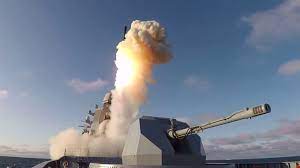BUCHAREST (AFP): NATO member Romania on Friday denied Russian missiles crossed its airspace on their way to Ukraine after Kyiv said Moscow unleashed a “massive” attack from the air.
The fresh strikes come a day after Ukrainian President Volodymyr Zelensky lobbied for long-range weapons visiting EU leaders in Brussels, in only his second trip abroad since Moscow invaded just under a year ago.
With the conflict approaching its first year mark, the Kremlin announced Friday that Russian President Vladimir Putin will deliver his annual state of the nation speech on February 21.
Last year, the Russian leader did not deliver the annual address to lawmakers and did not hold his traditional end-of-year press conference.
Ukraine’s army chief Valery Zaluzhny said two Russian missiles crossed the airspace of ex-Soviet Moldova and NATO member Romania on their way to Ukraine.
Romania’s defence ministry said it detected an “aerial target launched from the Black Sea from a ship of the Russian Federation” but “at no point did it intersect with Romania’s airspace”.
The Moldovan defence ministry said it detected a missile, confirming it “crossed the airspace of Moldova.”
Moldova, which has already seen debris of Russian missiles during the war, said it would summon Russia’s ambassador over the incident.
Strikes on energy
Kyiv residents on Friday once again took shelter, including in the subway, as Russia unleashed a barrage of missiles and drones across the country.
“(Russians) are attacking us once again,” grumbled Iryna. “We must continue to work. But to be safe, I went down to the subway.”
“The enemy struck cities and critical infrastructure facilities,” the air force said, adding that seven Iranian-made explosive drones were launched from the Sea of Azov and six Kalibr cruise missiles from the Black Sea.
The air force said it had intercepted 61 out of 71 Russian missiles fired.
Russia also carried out a “massive” attack with “up to 35 anti-aircraft guided missiles” targeting the Kharkiv region in the east and the southern Zaporizhzhia region, it said.
The strikes also targeted the western Lviv and Khmelnytskyi regions, and 10 missiles were shot down over the capital Kyiv, officials said.
For several months, Russia has been systematically targeting Ukraine’s energy infrastructure, leading to power shortages that left millions in the cold and dark in the middle of winter.
Ukraine’s energy operator Ukrenergo, said “power plants and high voltage network facilities” were affected in the east, west and south of Ukraine, leading to power outages in some regions.
It added that the “most difficult situation” was in the Kharkiv region, near the border with Russia.
Russia last targeted Ukraine with a mass strike in late January, days after Western allies agreed to deliver heavy tanks to Kyiv after long deliberations.
Zelensky’s push for weapons
Friday’s wave of attacks follows Zelensky’s visit to Europe, where he urged allies to supply Ukraine with long-range missiles and fighter jets as Kyiv braces for a renewed Russian offensive in the east.
Zelensky warned that Ukraine needs artillery, munitions, modern tanks, long-range missiles and fighter jets faster than Russia can prepare what he said would be a dangerous new offensive.
Zelensky said he saw “positive signals, concerning the respective weapons” from EU leaders and expressed hope those murmurs would become a “concrete voice”.
But some EU leaders were warier, fearing it could drag the West closer to direct conflict with Russia.
French President Emmanuel Macron warned that even if fighter jets were to be sent to Kyiv, it would not be in “the coming weeks”.
“I’m not ruling anything out… but that doesn’t correspond to today’s requirements,” Macron said Friday.
Polish Premier Mateusz Morawiecki said his country “will not be the first to hand over fighters” but would welcome others leading the way, while Britain said it would consider it as a “long-term solution”.
The situation, however, is becoming more pressing on the ground in eastern Ukraine, where months-long fighting for control of Bakhmut, a key town in the eastern Donbas region, has left many casualties on both sides.
Moscow said Russian forces were advancing on Bakhmut and Vugledar — two key centres of fighting in the eastern Donetsk region of Ukraine, now the flashpoint of the war.







